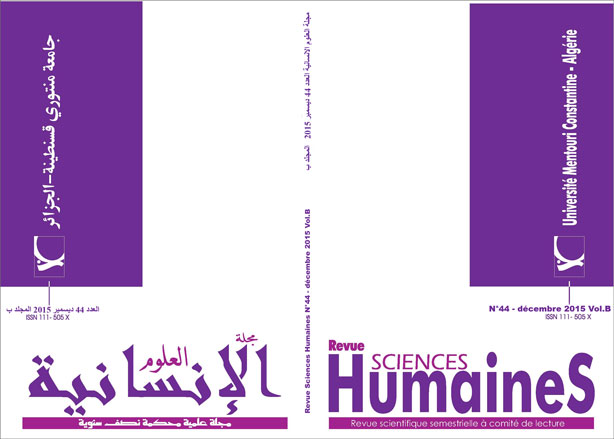English Lexical Errors Committed by Algerian Learners The Case of Second Year University Students
Keywords:
English Lexical Errors, Algerian Learners, Second Year, University, StudentsAbstract
This paper investigates the lexical errors committed by Algerian learners of English in their written compositions; our main aim is to analyse their lexical deviations following James’s (1998) taxonomy, and to find the reasons that lead them to err. The obtained results revealed that errors of distortion are the most frequent error type followed by collocations. The main source of errors is the learners’ serious lack of vocabulary knowledge in form and meaning.
Downloads
References
- Agustin Llach, M.P. (2011) Lexical Errors and Accuracy in Foreign Language Writing. UK: Multilingual Matters.
- Ambroso, S. (2000) Descripcio´n de los errores le´xicos de los hispanohablantes.Ana´lisis de la Produccio´n escrita de IT, El Certificado de Competencia General Enitaliano Como L2. In Agustin Llach, M.P.(2011) Lexical Errors and Accuracy in Foreign Language Writing. UK: Multilingual Matters.
- Djokic, D. (1999) Lexical Errors in L2 Learning and Communication. Rassegna Italina di Linguistica AplicataVol. 31, 123_135.
- Duskova, L. (1969). On Sources of Errors in Foreign Language Learning. International Review of Applied Linguistics, 7, 11–36.
- Engber, C.A. (1995) The Relationship of Lexical Proficiency to the Quality of ESL Compositions. Journal of Second Language Writing 4 (2), 139_155.
- Hemchua, S. and Schmitt, N. (2006) An Analysis of Lexical Errors in the English Compositions of Thai learners. Prospect Vol. 21, 3-25. In Agustin Llach, M.P.(2011) Lexical Errors and Accuracy in Foreign Language Writing. UK: Multilingual Matters
- James, C. (1998). Errors in Language Learning and Use: Exploring Error Analysis. New York: Longman.
- Kallkvist, M. (1998) How Different are the Results of Translation Tasks? A study of lexical errors. In Agustin Llach, M.P.(2011) Lexical Errors and Accuracy in Foreign Language Writing. UK: Multilingual Matters
- Laufer, B. (1991) Some Properties of the Foreign Language Learner’s Lexicon as Evidenced by Lexical Confusions. IRAL 29 (4), 317_330. In Agustin Llach, M.P.(2011) Lexical Errors and Accuracy in Foreign Language Writing. UK: Multilingual Matters.
- Raimes, A. (1985). What Unskilled ESL Students do as they Write: A Classroom Study of Composing. TESOL Quarterly, 19, 229–258
- Richards, J. C. (1976). The Role of Vocabulary Taching. TESOL Quarterly, 10, 77–89.
- Ringbom, H. (1983) Borrowing and Lexical Transfer. Applied Linguistics 4, 207_212.
- Warren, B. (1982) Common Types of Lexical Errors Among Swedish Learners of English. Moderna Sprak 76 (3), 209_228.
- Yang, X. & Xu, H. (2001). Errors of Creativity. An Analysis of Lexical Errors Committed by Chinese ESL Students. University Press of America, Inc.
- Zimmermann, R. (1987) Form-oriented and Content-oriented Lexical Errors in L2 Learners. IRAL 25, 55_67.In Agustin Llach, M.P.(2011) Lexical Errors and Accuracy in Foreign Language Writing.UK: Multilingual Matters.
















